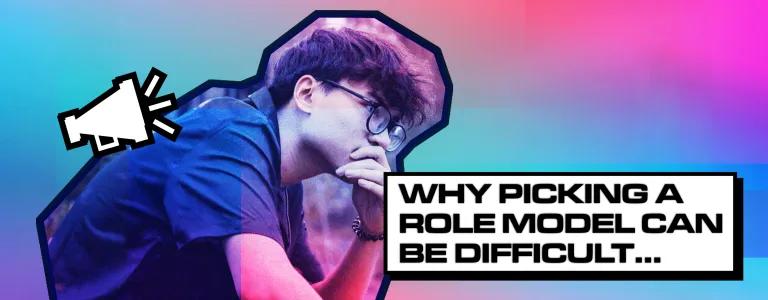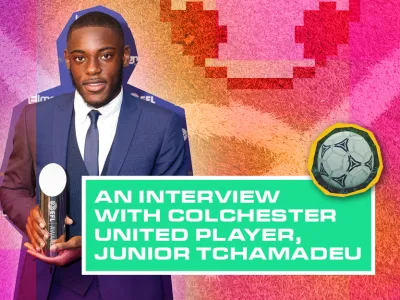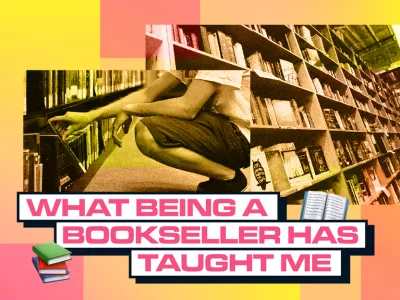
Why Picking A Role Model Can Be Difficult…
By Writers’ Club member Faiyaz, who talks about the strengths and flaws of potential role models…
As we grow up and make our way out into the world, I think it’s easy for us to struggle with finding our identity. It’s a really important thing to have figured out, because it helps you understand where exactly you fit in the world, but during adolescence it’s quite hard to stick to just one. Perhaps this is why the concept of a ‘role model’ is so ubiquitous – having one person that you can draw inspiration from, and aspire to become like, provides a much needed helping hand to us young people as we figure out what kind of person we want to be. Everyone has their own role models for their own reasons, although I feel that it’s all too easy to idolise someone without considering what their flaws may be, or even sometimes for the wrong reasons.
And not too long ago, I was sort of guilty of this myself. Have you ever heard of Fight Club? You aren’t supposed to talk about it, but it’s an excellent movie with an unforgettable main character: Tyler Durden. Described as a devil-may-care soap maker, he’s an unbridled anarchist who values his own personal freedom above all else, and much more than the average person. As a result, he’s able to act extremely cool no matter what hardships life throws at him – and it didn’t take much for me to earn massive respect for him.

Idolising fictional characters like I did with Tyler can be a double-edged sword, because while they live proactive and exciting lives, which teach them important lessons, and are understandably more appealing than our everyday lives, they aren’t always written to be idolised. Take Tyler, for instance. While he is a confident, charismatic, independent figure who is very difficult to keep down, this comes at the expense of the people around him. And when one of his subordinates dies as a result of his actions, he shrugs his shoulders and simply says, “You wanna make an omelette? You gotta break some eggs.” No-one could see him as a role model forever.
That was a few months ago, and while there are some aspects of his character I would still like to emulate, I couldn’t call Tyler Durden a role model anymore. Unfortunately, it seems to be the trend among many alienated young men to idolise headstrong guys just like Tyler, be they fictional or not. In the limelight recently has been one Andrew Tate, a former kickboxer turned social media influencer, with opinions so polarising you wouldn’t think they’re real.
Without going into too much detail, Andrew is an extremely misogynistic person, and yet he’s been viewed 11 billion times on TikTok. While some of this attention is from critics, more still come from his legion of dedicated fans who see him not as a problematic figure spreading vile ideologies, but as a fully independent man teaching his disciples how to “escape the Matrix”. It’s quite funny to me, because in some ways he comes across as Tyler Durden IRL – they’re both extremely self-motivated and unstoppable men who will do whatever it takes to reach their idea of the top, not caring for the consequences of their actions. But while my Tyler phase fizzled out with no repercussions as I began to adopt new ideals, Andrew Tate’s fans are openly hostile to anything he speaks ill of, which, if you know anything about the man, you know is quite a lot of things. It’s for this reason that I think it’s extremely important to be sure that someone is your role model for the right reasons.
A recent Guardian article explained how young men can be shown these kinds of ideas even if they don’t go looking, and showing it to a down-on-his-luck boy with few aspirations in life and frustrations against the world( just like how I stumbled upon Fight Club on Netflix one fateful night) can have serious consequences. It’s not a good thing if the role model finds the admirer, and not the other way around.
Although seemingly obvious, it’s often easy to forget that no one is perfect, and to become enamoured with a role model while ignoring their flaws. Still, I do believe that good role models are out there. For instance, as an antithesis to Andrew Tate, take Noel Deyzel. He’s a content creator who shares tips and tricks for the gym with his viewers, so like Andrew, he appeals to young men like me. That’s where the similarities between the two end though, as where Andrew is abrasive and full to the brim with insane opinions that get all the more sensational, Noel is a down-to-earth man who shares what he’s learnt during his life, and always aims to reassure his viewers that they can achieve their goals.

He’s also been known to share his insecurities, acknowledging that he isn’t perfect, and therefore comes across as a far more genuine person. It was quite a roundabout path for me to find a suitable role model, but in Noel Deyzel I think I finally have. It’s really good to have a role model, especially if they’re a real person, because they not only show you what kind of person you should strive to be, but by their mere existence they prove that this kind of life is possible to lead. And although it’s very possible to be led astray by idolising someone problematic like Tyler Durden or Andrew Tate, I still think that the idea of a role model is a noble one, and that eventually everyone can find someone genuine to aspire to be like.




